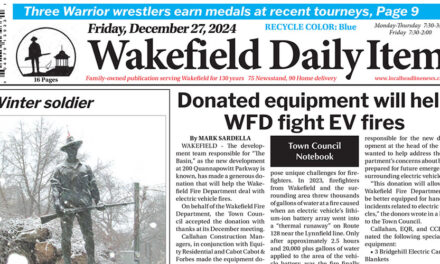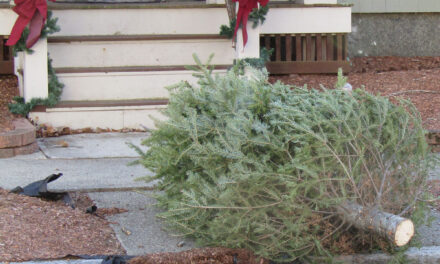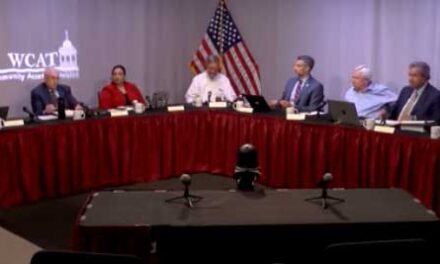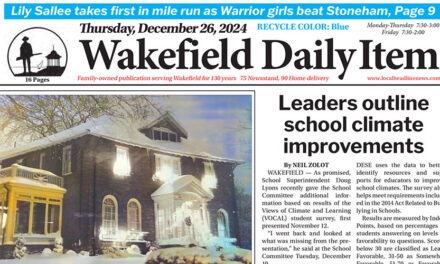Over the coming weeks, we will highlight the four referendum questions on the Nov. 4 election ballot.
By GAIL LOWE
WAKEFIELD — In addition to voting to fill several state offices, including governor, Massachusetts residents on Nov. 4 will also voice their opinions on four proposed measures, the first one concerning the repeal of the gas tax.
The proposed law in Question 1 would eliminate the requirement that the state’s gasoline tax, which was 24 cents per gallon as of September 2013, be adjusted every year by the percentage change in the Consumer Price Index over the preceding year but not be adjusted below 21.5 cents per gallon.
Those in favor of the proposal say it would simply stop the linkage of the gas tax to inflation. This linkage causes the tax to increase every year without a vote of the Legislature, which amounts to taxation without representation. If the Legislature wants to increase taxes, those in favor say they should have to vote for it. No tax should automatically increase.
On the other hand, those not in favor of the measure say the money raised by the automatic increase is needed to fund improvements to the Commonwealth’s bridges and roads. Opponents of the repeal say it threatens people’s safety while traveling around the Bay State and that the infrastructure problems are startling.
From the town’s point of view, Department of Public Works Director Richard Stinson said that Wakefield does not receive enough funding to keep up with the paving of roadways; therefore, he would be in favor of keeping the current law in place.
“To maintain the roadways, we need to pave two to three miles every year and we’ve been falling behind,” said Stinson.
Wakefield’s DPW Director added that the amount the town needs is between $1.7 and $1.8 million, but the average is $700,000 from the state.
“The town provides $200,000, so we are about $800,000 short every year,” said Stinson. “Whether a repeal is the correct way to fund this, I don’t know. If money will go to cities and towns it will be (the correct way). It’s the same all over the country. The majority of states have a gas tax. But I don’t know how they will address the shortfall.”
According to those in favor, the initiative cuts no money for bridge or road repair. It just requires the Legislature to take a vote if and when they want to raise the tax.
Residents already pay hefty gas taxes — 26.5 cents for state taxes and 18.4 cents for federal. For an average 15 gallon fill-up, $6.73 is spent in taxes.
But according to Nick Tsitsinos, owner of Depot Automotive (commonly known as Local Gas) at the corner of North Avenue and Albion Street, the tax is more like 40 to 50 percent per gallon of gas. If a gallon of gas costs $3.50, then $1.75 is the tax, he said.
“I don’t want to see the price of gas rise,” said Tsitsinos. “People are happier now that prices are lower. I wish we could go back to gas being 99 cents a gallon. Due to the gas tax and what’s going on in the economy, gas prices jump suddenly.”
Tsitsinos acknowledged that the gas tax helps to improve roadways and bridges but said that Mass. Lottery money is also supposed to help.
“North Avenue by the Lake is horrible,” he said. “The town’s roadways need work.”
Within the last year the administration has reinstated tolls, raised registry fees by 20 percent and raised other taxes. And the last time gas taxes were increased the money was diverted from road repair. The state has a spending problem, not a revenue problem, those in favor of the proposed law say.
At a debate between incumbent Ninth Essex Republican State Rep. Donald Wong and democratic challenger Christopher Finn of Saugus last week, Finn said he would oppose Question 1.
“Our roads are crumbling,” Finn said. “Our bridges are crumbling. That’s money we need to improve our roads and bridges.”
Wong said he would cast a “yes” vote to eliminate the automatic yearly increase in the gas tax, arguing that it would cause the cost of living for the average person to go up since every product purchased is transported by trucks.
According to the Federal Highway Administration, 53 percent of all bridges in the state are either structurally deficient or functionally obsolete. Moreover, 27 bridges have been closed because they are unsafe. Potholes and bad roads cost Massachusetts residents $2.3 billion a year in car repairs.
Those in favor of passing the law say that after decades of neglect, the poor condition of Massachusetts bridges and roads is now a significant public safety crisis and the longer the wait, the more it will cost every taxpayer to fix the problems. Opponents say that a vote in favor of the gas tax repeal would make things even worse by taking away existing gas tax revenues needed to solve the public safety crisis — revenues that, under the state constitution, can only be used for transportation needs.




